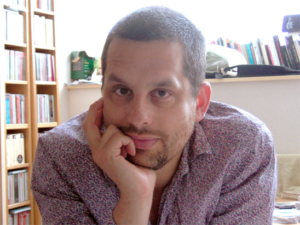 Last winter, Full Stop introduced “The Situation in American Writing,” a questionnaire adapted from The Partisan Review that asked questions about literature’s responsibility to address seismic changes in culture, the publishing industry, and the political and geopolitical landscape. That questionnaire, which featured responses from Marilynne Robinson, George Saunders, Victor LaValle, T.C. Boyle, Dana Spiotta, and dozens of other writers was illustrative of the concerns and preoccupations that writers carry with them when practicing their craft.
Last winter, Full Stop introduced “The Situation in American Writing,” a questionnaire adapted from The Partisan Review that asked questions about literature’s responsibility to address seismic changes in culture, the publishing industry, and the political and geopolitical landscape. That questionnaire, which featured responses from Marilynne Robinson, George Saunders, Victor LaValle, T.C. Boyle, Dana Spiotta, and dozens of other writers was illustrative of the concerns and preoccupations that writers carry with them when practicing their craft.
This year we are interested in the situation of writers, rather than writing, in the subjective experience of writing fiction, rather than fiction’s responsibilities to respond to a rapidly changing world. To this end we are interested in examining the trying intellectual, creative, and emotional labor that is often unacknowledged or effaced in the public presentation of writing. What we’re interested in, to put it another way, is pathos.
This year, we’ve crafted a questionnaire asking writers about the effect writing has had on their physical, emotional, and economic health; on the idea of poverty being a precondition for writing well; on what makes writing truthful to one’s self and to readers. Ultimately, we are interested in the consequences of pursuing writing as a vocation.
Lars Iyer is the author of a trilogy of novels, SPURIOUS, DOGMA and EXODUS, the last of which will be published in January 2013. The series has recieved rave reviews in nearly all major literary publications including The New York Times Book Review, The Los Angeles Times, The Washington Post, The Times Literary Supplement, Publishers Weekly, Library Journal, The San Francisco Chronicle, The Guardian (UK), The Spectator and The Believer. SPURIOUS won 3:AM’s ‘Best novel of 2011’ award, was a finalist for the Guardian Not-the-Booker Award, and was shortlisted for The Believer award.
Lars Iyer has also written two scholarly books on the work of Maurice Blanchot, and teaches philosophy at Newcastle University, UK.
As will become clear, Lars is an appropriate figure to kick off our Pathos series, though he has provided his own title.
BEHOLD THE IDIOT
THE FULL STOP PATHOS QUESTIONNAIRE
How has your decision to write affected your health? Has it had negative effects on your personal life?
‘To lead a really spiritual life while physically and psychologically healthy is altogether impossible. One’s sense of well-being runs away with one’: that’s what Kierkegaard writes in his journals. Could the same be said about leading a really literary life? On the face of it, novel-writing requires a sustained effort that depends upon a basic mental and physical well-being. But there are writers who have distrusted such well-being, subjecting themselves instead to a programme of self-induced suffering. I am not thinking here of Rimbaud’s determination to systematically derange his senses, or Nick Land’s ‘fanatically prolonged artificial insomnia’, but of writers who have sought to bear the burden of the suffering of others.
‘My solitude held in its grasp the grief of others until my death’: that’s how Simone Weil’s tombstone reads. In the last months of her life, Weil wrote her famous texts on affliction and attention, on gravity and grace, with what one commentator calls ‘almost supernatural steadiness, rapidity, and assurance’,
page after page streaming out virtually without hesitations or corrections. She often worked around the clock, staying through the night in the office in Hill Street or walking home long after the last Underground train and continuing to work in her apartment for several more hours, all the while coughing steadily and violently. The force and substance of her life were poured in an almost literal way into the writing that filled her notebooks[….]The physical collapse that occurred on April 15, 1943, was surprising only in having been so long in coming. Weil had written herself to the brink of death.
Weil sets an example of a practice of writing which works against your health, keeping the thought of the suffering of others immediately to hand.
Alas, my health is all too robust, and I am far from holding the grief of others in my grasp! But I think of Weil’s example when I deal in my novels with topics like climate change and social inequality.
Has writing affected my personal life? I have always admired those authors who embed their writing in the everyday. I think of Aharon Appelfeld, writing in cafés. ‘I never made a fuss about my writing’, he says,
Everything I wrote was in cafés, mostly quiet cafés, but also in bustling, crowded cafés. It never bothers me when people talk. Many writers have tortured their families because the noise made it difficult for them to concentrate[…] I have a great deal of respect for an artist who doesn’t impose his moods on those around him. Writing is a struggle, and it should be between you and yourself, without involving additional people.
I hope I don’t impose my moods on anyone around me! Writing literary fiction today is a marginal activity, a petty thing. This makes literary self-importance even more revolting …
There is long tradition that links the craft of writing with poverty. Do you think that’s appropriate? Does poverty feel like the most appropriate condition for your practice as a writer?
I worked as a part-time lecturer for many years, supplementing a meagre wage with government benefits. I was one of the ‘precariat’ – a very common experience for beginning academics. This places your sympathies with the exploited – with the unemployed and underemployed. It puts you on the side of those who do not have ready-made channels to success, who lack powerful connections.
I write of these conditions in Exodus, having my characters celebrate the honest misery of the postgraduate and the postdoctoral researcher over the privileged life of the university lecturer. The fabled postgraduates of Essex, so admired by my characters, lived on the margins of British society in the 1980s, feeling acutely the impossibility of reconciling themselves with that society. This was the condition of their own creativity, my characters think. ‘A creator who isn’t grabbed round the throat by a set of impossibilities is no creator’: Deleuze and Guattari write that. I’m not sure if I could say that I was grabbed round the throat by a set of impossibilities as a part-time lecturer and before, but I was no creator, not then at least. I found the stress of living as one of the ‘precariat’ too great for any sustained task of writing.
In a rare 1983 interview the enigmatic and often dour Romanian writer Emil Cioran speaks about only reading Nietzsche’s letters because he became concerned with how untruthful Nietzsche’s published works seemed when read against the miserable condition of his day to day existence (isolated, weak, sickly, certainly not characterized by any sense of vigor). Is there any sense in which the truth of one’s condition should be related to the truth of one’s writing, even if in an oblique sense?
Cioran does not take Nietzsche at his word. ‘Each time I had been weeping too much on my walks the day before, not sentimental tears, but tears of rejoicing; and as I wept I sang and talked nonsense, filled with a new vision …’: that’s Nietzsche. Are Nietzsche’s sufferings genuinely tragic, leading him to profound insights, to tears of rejoicing, or are they merely petty, belying his lofty claims in the manner Cioran suggests?
For Philip Larkin, a commentator notes, ‘what’s saddest of all is that life is less than tragic. Indeed, to his mind, tragedy is secretly a modality of hope, for the extremity of complaint is seen as a sort of covert refuge whereby our suffering is accorded a significance it doesn’t deserve and thus surreptitiously “redeemed”’. Larkin’s task is perhaps similar to Cioran’s: to write of non-tragic suffering, mundane and unignorable.
But we needn’t follow Cioran’s brand of nihilism. The philosopher Levinas often quotes Pascal: ‘”That is my place in the sun”: that’s how the usurpation of the world began’. We are usurpers, Levinas claims, because the place we occupy, the life we enjoy, is lived at the expense of others. We do not have to subscribe to the details of Levinas’s philosophy to grant him this point. Before Nietzsche’s would-be tragic suffering, before Larkin’s less-than-tragic suffering, there is the suffering of others, of those whose place you’ve usurped. Doesn’t any account of the ‘truth of one’s condition’ have to include these others?
For me, Weil’s practice of writing is exemplary when it comes to truth-telling. For a writer like Weil, the days of ruin and devastation are always at hand. Our time is always apocalyptic, and we are each responsible for the apocalypse. The literary task lies in marking this ‘end of times’ in our work. I think of something Gillian Rose quoted in her writings: ‘Keep your mind in hell and despair not’.
Are you envious of other people’s success? If so, are you more envious of people’s success in your field or outside of it? Why?
I’ve just finished watching the fifth season of Mad Men, and envy those involved in the show — the story editors, scriptwriters and actors the very life of their medium. People talk about Mad Men and series like it! They look forward to the release of the DVD boxset; they share it with their friends.
How unlike the world of contemporary literary fiction, at least as I experience it! Does anyone actually read literary novels anymore – new novels? Does anyone talk about them outside university literature departments (or even inside university literature departments)?
Of course, there are breakout successes in literary fiction — but they never remotely resemble anything I write! For that reason, I don’t feel envious of more successful literary-fiction writers. I don’t feel they have anything to do with me, and I feel a general sense of disconnection from the literary world.
Aside from writing, do you have any other marketable skills? If so, are you ever tempted to cease writing fiction entirely so you can live a more stable life?
I have all the stability I need: I work full-time as a philosophy lecturer, writing fiction on the side.
Give one example in which you had high hopes for success (artistic, commercial, or otherwise) but had those hopes dashed.
I did have some modest hopes as a philosopher – that I could make a meaningful contribution to my field. The dashing of those hopes is the substance of my trilogy of novels.
If you are to secure a career as an academic, you have to write and publish a great deal after you finish your studies. You have to learn to write in an appropriate way, and to tailor your essays for journals and book publishers. If you want to succeed, it is best to identify with a certain position, or a school of thinkers, or perhaps one particular thinker. Would-be philosophy lecturers strap on the exoskeleton of one great thinker or another, and stride about the philosophical landscape. You make a name for yourself as a Kantian, say, or a Husserlian, as something –ian, at any rate, forgetting for the moment that you’ve only really borrowed your strength. The time of reckoning comes once you’ve got a permanent job, and lose your alibi of having to publish. You have to begin all over again, more humbly this time, working more slowly and depending on your own strength. The danger is that you end up like those Žižek calls ‘poor idiot professors’, writing on this and then that … At the end of your struggle for an academic job, it’s a mediocrity that you see in the mirror.
In my case, my time of reckoning led me in a different direction. Blogging allowed me to write of my sense of failure. Perhaps if I hadn’t spent so much time at my blog writing about my failure, I wouldn’t have been a failure! On the other hand, writing about my failure became a certain kind of success …
Do you feel like the world owes you a chance to make a living as a writer?
Absolutely not! No – in the strongest possible sense. I cannot stand any self-importance associated with the ‘creative arts’, or any sense that anything is owed to you because of them. The writer as entertainer: that’s my model. The writer as buffoon, with his cap and bells …
What is the strongest emotional reaction you have ever elicited from a reader, either in your written work or during a reading? What is the strongest emotional reaction you have ever elicited from yourself during the writing process?
Rereading my first attempts at academic prose horrified me. Nick Land writes:
Academic prose has the remarkable capacity to plunge one into a sublime dystopian nightmare: is anything this appalling really possible? One asks. What happened to these people? Is it part of some elaborate joke perhaps? Or do they just hate books? There is a sense in which one can only admire their ability to make Nietzsche seem like a bank manager, Bataille like an occupational therapist, or Derrida world-historic, but in the end one vomits. Such writing is unparalleled as an introduction to despair[…] (With trembling fingers one turns the pages: we have really come to this). One only has to read genuine scholarship to be wracked by ardent dreams of incinerated cities.
Land’s point counts all the more when it comes to would-be academic prose. I felt the horror of which Land writes at my own would-be scholarly writings. The ‘would-be’ is important here, because back then I lacked even the minimal ability to write, to form a sentence. How grotesque! Horror at my own prose: that was the strongest emotional reaction that my work ever elicited from me … Horror at my scholarly imposture …
But there was more than that. Because I wasn’t content to be a scholar. I wanted my work to be relevant somehow, to address the present somehow. I wanted to make it ‘political’ in the vacuous academic sense of that word, where the political is everywhere and therefore nowhere. ‘Political’ in that safely academic sense, writing of hope without doing anything to bring about the conditions of hope. So I experienced a second, deeper horror: the horror of political imposture.
In the early days at the blog, I wrote a series of posts in which I reversed some of the formulations from Nietzsche’s Ecce Homo, his ‘Behold the Man’. Nietzsche’s text has chapters with titles like ‘Why I am a Genius’, ‘Why my work is world-historical’, ‘Why I am a Destiny’. I wrote comically self-lacerating posts with titles like ‘Why I am not a Genius’, ‘Why I am not a Destiny’. The response I got to these posts was gratifying: people recognised themselves in my self-portrait, in the ‘Behold the Idiot’ of my blog posts.
When are you at your most truthful as a writer?
I think I became more truthful when I marked the distance I felt with respect to the European writers who interested me – the distance between my world and the world they inhabited. When I wrote about the British context in which I was reading – a context in which the writers important to me had made no impact, and were regarded as drivel if they were known at all; a context in which mass culture had long since displaced the forms of high culture on which my writers depended; a context that had been drained of meaning by neoliberal capitalism. I was surprised to find myself turning into a comic writer. I put on my jester’s cap.
Self-knowledge is important – wise people have always agreed on that, placing a value on introspection, on exploring the inner self. But such self-knowledge cannot be complete unless it understands the way in which the inner self is constituted. My novels to date have been what are called ‘autofictions’ – they are fictionalised, absurdly exaggerated self-portraits. But my task was to lay bare the constitution of my characters – the way they were formed by the culture in which they lived, as well as the larger forces of capitalism. That was my aim, above all, in Exodus, which I hope is the most truthful of my books.
This post may contain affiliate links.







